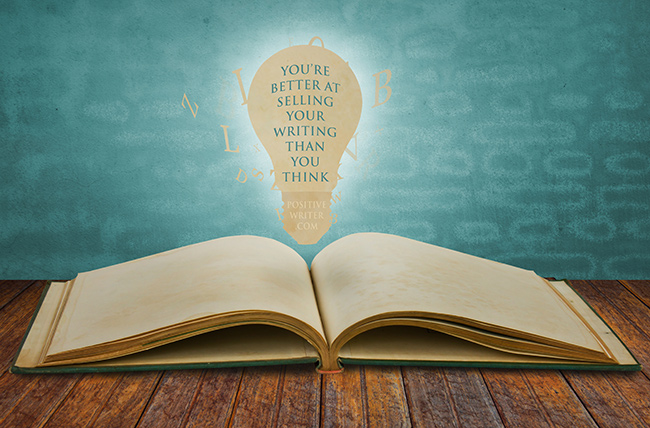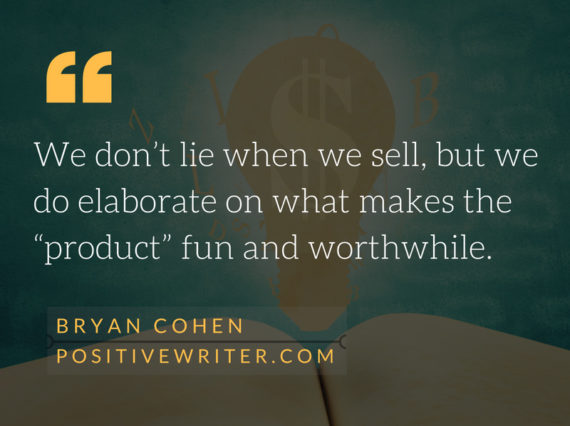Note: This is a guest post by Bryan Cohen. He is an author, a podcaster, and a coach. His 40+ books have been downloaded nearly half a million times. If you’re interested in finding out more about selling, pick up a free cheat sheet on the subject at sellingforauthors.com
Most authors believe they’re no good at selling.

A few chats with author groups or one-on-ones with writers would likely tell you that trying to actively sell their digital or physical stockpile of books is near the bottom of their to-do list as an author.
But are writers really as poor or inexperienced at the concept of “selling” as they think? It’s time to review the facts.
Selling isn’t about scammy telemarketing or late-night infomercials. It’s about answering the all-important customer question:
“What’s in it for me?”
Whether you’re selling an air conditioning unit or a ketchup Popsicle, if you can effectively answer that one question, you’re very likely to get the sale.
In our daily lives, we actually spend a good portion of our time answering this question for our loved ones. Let’s say you’re extremely interested in going to see a new movie. At the time I’m writing this article, Marvel’s Doctor Strange, starring Benedict Cumberbatch, is the top box office draw, so let’s use that as an example.
You desperately want to see this movie, but your best popcorn pal tries to change the subject whenever you mention it. Some people would give up and wait until the movie comes out on Blu-Ray, but most film buffs would do their best to convince their friend to go.
In other words, if you wanted to see the movie, you would try to “sell” your friend on attending.
When you try to convince a loved one to do something you want to do, what’s your usual course of action?

First, you may remind your friend that her favorite show, “Sherlock,” likewise stars that sexy British actor Benedict Cumberbatch. Next, you might also point out that they enjoyed director Scott Derrickson’s previous movies. You could even compare it to similar films they’ve seen and raved about.
By showing your friend the similarities between Doctor Strange and other things she likes, you’ll improve your chances of making “the sale.”
Here’s another challenge I’m about to be facing more as a soon-to-be parent: getting your child to eat his food.
When a kid is fussy about his lunch, many parents try to pump up the excitement a bit. The spoon with the food isn’t just a utensil; it’s an airplane. The strained carrots aren’t merely about satisfying his appetite; they’ll allow him to grow up to be big and strong.
We don’t describe lunch as a boring slop; we say that it’s a delicious experience!
We don’t lie when we sell, but we do elaborate on what makes the “product” fun and worthwhile.

One last example:
Let’s say you’re trying to convince your sister to be the +1 for a wedding you’re forced to attend. Most of the time, you’re not going to go through a laundry list of 900 reasons why she should accompany you.
You’ll probably try to keep your pitch short and sweet. Perhaps in the form of, “I’ve got two words for you. Open bar.”
A condensed hook directed at your target “customer” will often seal the deal.
Three Major Skills that will Help You Sell Your Writing
If you’ve ever used a succinct pitch, made your product sound exciting, and related it to things your customer has seen before, then you’ve already trained up three major skills that will help you sell your writing.
- Short, snappy, movie-poster-esque headlines entice your potential reader.
- A synopsis that highlights the best parts of your story without going too heavy on plot gets your potential customer interested in what comes next.
- A few meaty adjectives that make your book sound similar to the best-of-the-best help to break down buying barriers.
Following all three of these steps every time you write a book description, a Facebook advertisement, or a launch announcement to your email list, will work wonders for getting your book sold.
You’ve already had the practice in real life. Now it’s time to use those highly cultivated skills to sell your books as well.
What has been your biggest challenge with selling your writing? What’s worked for you? Share with us in the comments.
